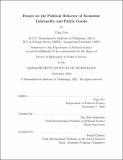Essays on the Political Behavior of Economic Informality and Public Goods
Author(s)
Gao, Ying
DownloadThesis PDF (5.083Mb)
Advisor
Schneider, Ben Ross
Terms of use
Metadata
Show full item recordAbstract
This dissertation examines the relationship between economic informality, political behavior, and public goods provision. In three papers, it explores how seemingly nonpolitical everyday social institutions and collective action rooted in economic informality help extend the reach of the state and advance public policies in developing societies. I document these complementary mechanisms using microdata and policy variations in Indonesia, an important case given its recent urbanization, democratic status, and the world’s fourth largest and highly diverse population. Does informal housing (or slums) cause political marginalization? In the first paper, I delineate between housing informality of infrastructure and tenure insecurity, and posit that the former generates collective interests and demand for the state. Using a panel survey of Indonesian households from 1993 to 2014 with approximately 30,000 observations, I find that those in housing lacking piped water and sanitation access are significantly more likely to speak the national language, express support for vote buying, yet show lower ethnic trust. In light of theoretical knowledge on historical urbanization and political identity formation, results suggest that social contexts afforded by informal housing can produce clientelism alongside attitudes of political integration. I expand on the implications of the connected political and social behaviors of informality by assessing its effects on public policies. I develop a theory of community-driven development’s impact on informal settlement leaders. A field survey of 258 formal and informal leaders in urban communities under Indonesia’s National Slum Upgrading Program and a comparison group reveals modest effects. The final paper tests the role of quotidian social groups in the setting of Covid-19’s economic distress and public health urgency. In a sample of 1,085 Indonesian workers across informal employment sectors, I ask if and why vulnerable informal workers may comply with costly restrictions. Survey experiments varying information regarding a hypothetical but realistic lockdown policy demonstrate that information endorsement by workers’ membership associations significantly boosts compliance. Taken together, this dissertation challenges the scholarly pessimism around growing urban informality and contributes to the study of comparative political economy and urban politics of development.
Date issued
2022-09Department
Massachusetts Institute of Technology. Department of Political SciencePublisher
Massachusetts Institute of Technology